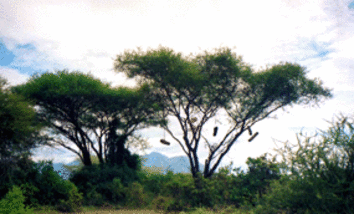What is required for management and development
In view of the human dependence on natural resources and their exhaustibility a natural resource management and a societal development are required which are sustainable and environmentally appropriate (Förch and Schütt 2004 b).
Sustainability and environmental appropriateness
Resources have to be managed in such a way that the demand of the present generation can be satisfied without exhausting, degrading or destroying them in the long term in order to preserve them as a basis of survival for future generations (intergenerational equity) (Lal 1995). Such a management for the benefit of the people and in harmony with the environment implies that
- resources are only to be used if they are renewable (Förch and Schütt 2004 b) and
- are used at rates that correspond to the replenishment rates or at an intensity which does not exceed the carrying capacity of the system.
Unfortunately, most management practices of today are not sustainable (Ewert et al. 2004).
The overall societal development has to be sustainable as well. Sustainability in all its dimensions can only be attained if the goals are defined according to the environmental, socio-economic, political and institutional framework. For example, winter sport tourism cannot be economically and ecologically sustainable in a region only receiving snow five days per year on average. Here, the pistes has to be prepared by snowguns consuming valuable water and energy resources.
To achieve a sustainable development at least two requirements should be considered:
- to address also intragenerational equity issues. People who don't have enough food today will be less concerned about the needs of future generations (Mitchell 2002);
- to develop environmental knowledge and skills to allow for an economically sustainable utilisation of resources. For instance, a ban on the use of forests should not be imposed: instead, a sustainable forest management concept should be elaborated in cooperation with the population. A multitude of forest products (such as herbs and honey) can be used sustainably by the population for the satisfaction of their needs and for income generation (Förch and Schütt 2004 b) (see figure). The UN proclaimed ‘Education for a sustainable development’ as a UN decade from 2005-2015.
Further information about Sustainability
For future watershed managers who are responsible for natural resource management and rural development it is worthwhile to give greater consideration to the concept of sustainability. Web sites and web pages of several organisations and institutes provide information about this topic; here are a few links navigating you to interesting internet resources:
Planning has to be directed to this sustainable and environmentally appropriate development and its requirements. Therefore, an integrated approach of planning and management is applied which is explained on the next web page.

